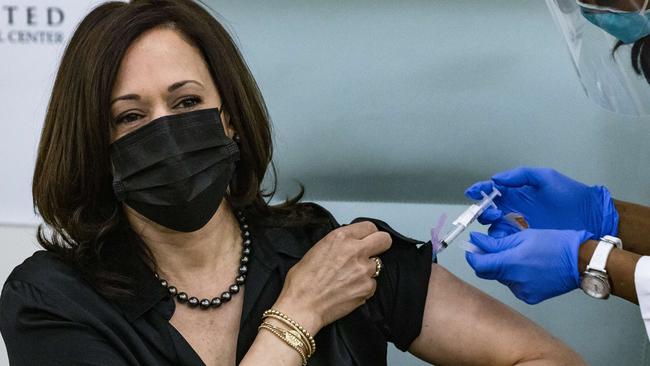
So what did countries such as the US, Britain, Israel and others do differently to Australia that helped them to vaccinate their populations so much faster than we did? The answer lies in the ordering and distribution of vaccines. They ordered more vaccines earlier, built in insurance and distributed the vaccines efficiently and conveniently.
Despite being told we were at the head of the queue, Australia was not. We ordered too few vaccines and chose a cumbersome distribution method.
In January, a briefing was offered to Labor MPs on the government’s vaccine rollout. I asked the senior health official why the government had not done a deal with Moderna. It already was proving to have excellent results in the US and was the vaccine administered to the new Vice-President, Kamala Harris. The answer shocked me. The official was dismissive and pointed to a policy hinging on AstraZeneca being the predominant vaccine for Australia, and the ability to manufacture vaccines locally.
As the party of manufacturing, Labor supports locally made vaccines; we’ve even committed to locally manufacturing mRNA vaccines such as Pfizer. But it was clear the government was not building in contingencies in case something went wrong with AstraZeneca. This is staggering when you consider we had a perfect warning after the University of Queensland’s vaccine candidate was abandoned when false positives of HIV were detected in its trial participants.
By November last year the US had signed deals with Pfizer, Moderna, Janssen, Sanofi, Novavax and AstraZeneca. The US had ordered 1.2 billion doses of vaccines with options built into contracts to purchase more. Subsequently it also has purchased another 300 million doses, many of which it will give to other countries.
By November last year Britain had signed deals for almost 400 million vaccine doses from a combination of Pfizer, Moderna, AstraZeneca, Janssen, Novavax, Valneva and Sanofi.
What about Australia? We cancelled our order with UQ, did a deal with AstraZeneca and signed a deal with Novavax that was going to be delivered in the back half of this year. In other words, before our rollout even started we had put all our eggs in the AstraZeneca basket. The only insurance we had was a small order of 10 million doses of Pfizer – not enough to cover even half the country if anything went wrong.
We hurried to order another 10 million doses of Pfizer in November last year, then waited until we had missed the first distribution target of four million doses by April this year before we did deals to secure Pfizer and Moderna contracts in April and May.
Then there’s the distribution. Labor was calling for mass vaccination hubs to be set up to mirror the way the US, Britain and Israel managed their rollouts. There, vaccines are distributed through local hubs, set up in carparks, shopping centres and even stadiums, a pharmacy or at a GP clinic.
But Australia prioritised setting up the GP clinics first, with a limited number of hubs belatedly set up and still no pharmacies allowed to administer the vaccine – despite the latter administering the flu vaccine every year. This put more burden on GP clinics, which were given a drip-feed of limited vaccines to roll out and were flooded with people attempting to book in.
Rather than take responsibility for these failures, the government appears to be backgrounding that it was all Department of Health secretary Brendan Murphy’s fault, with Sky News political editor Andrew Clennell saying on air, “What I’m led to believe is that Brendan Murphy has been a big problem here. Scott Morrison and Greg Hunt have listened to him and it has been their folly … he opposed a plan by Gladys Berejiklian to have the vaccinations in stadiums, he’s opposed the plan to have pharmacies do the vaccinations or at least push them out. He’s opposed the regional quarantine idea, and he was confident in the AstraZeneca solution.”
All of this shows Australia’s vaccine debacle wasn’t an accident, it was the result of bad design and bad decisions made by the Australian government.
Our success in suppressing the virus last year meant we weren’t overwhelmed with the pandemic response. The federal government should have used that time to ensure we had a rapid and efficient vaccine rollout ready to restore us to a post-pandemic normal. Instead we didn’t do enough deals, we chose a distribution method that was too slow and failed to replicate what was working around the world. As we face some of the most challenging days of this pandemic, it’s hard to think of a bigger failure of public policy in peacetime Australia than the Covid-19 vaccine rollout.
Even more frustrating is that it didn’t have to be this way.
Josh Burns is the federal member for the seat of Macnamara in Melbourne.



Our vaccine rollout was destined to fail before it even began. It was designed with outdated thinking and poor choices in procurement and distribution.